Recommendations
95 Recommendations
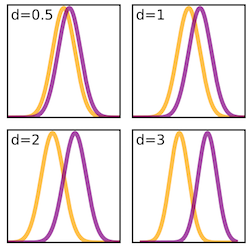
Effect size: What is it and when and how should I use it?
March 18, 2016 by Adrian Madsen, Eleanor Sayre, and Sam McKaganWhen making changes in the way we teach our physics classes, we often want to measure the impact of these changes on our students' learning. Often we do this by administering a research-based assessment at the beginning and end of the class and calculating the change between pre and post. There are several different measures that can be used to tell you, in one number, how to compare learning...
assessment, concept inventories, effect size, best practices
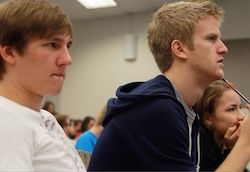
How can I set clear expectations, and motivate students, so that they engage in active learning?
June 20, 2017 by Stephanie Chasteen, University of Colorado BoulderIf you teach using active learning strategies, you may find that students don't automatically engage. Students may just sit back and listen, waiting for their peers to term. Luckily, open resistance is rare. You have the power to impact how students engage with the curriculum and the content.
active learning, expectations, first day of class, productive engagement, student buy-in

I suddenly have to move my face-to-face physics/astronomy course online! What should I do?
March 13, 2020 by Linda Strubbe and Sam McKagan, PhysPortIn the wake of COVID-19, many faculty are being asked to quickly shift their classes online. We are sharing with you ideas and resources that align with research-based pedagogical principles, research-validated resources for teaching online, and ideas that colleagues are trying as they make this transition.

Normalized gain: What is it and when and how should I use it?
March 18, 2016 by Sam McKagan, Eleanor Sayre, and Adrian MadsenIntroduction to normalized gain:
The normalized gain, introduced by Hake in 1998 "as a rough measure of the effectiveness of a course in promoting conceptual understanding," has become the standard measure for reporting scores on research-based concept inventories. Hake defined the average normalized gain as:
<g> = (<Post> - <Pre>)/(100 - <Pre>)
assessment, concept inventories, normalized gain, best practices

I suddenly have to move my lab course online! What should I do?
March 25, 2020 by Linda Strubbe and Sam McKagan, PhysPortIn the wake of COVID-19, many faculty are being asked to quickly shift their lab classes online. We are sharing with you ideas and resources that align with research-based pedagogical principles, research-validated resources for teaching labs online, and ideas that colleagues are trying as they make this transition.
How can I help students work well in small groups, so they are more likely to engage?
June 20, 2017 by Stephanie Chasteen, University of Colorado BoulderGroups do not always work productively, and not all tasks are suited to group work. Poor group dynamics, or ill-suited tasks, can reduce student engagement. This article focuses on helping students engage productively in active learning classrooms through the type of tasks that are used, and support of productive group dynamics.
group work, active learning, worksheets, productive engagement
Best practices for whiteboarding in the physics classroom
September 22, 2017 by Sam McKagan and Daryl McPaddenWhiteboards are an indispensable tool that physicists use to work out ideas individually and collaboratively, and to present those ideas, both for public discussion and critique of tentative ideas and for communication of more fully formed ideas. In this recommendation, we offer guidance for how to use whiteboarding effectively in your classroom.
whiteboarding, best practices, SCALE-UP, Modeling Instruction
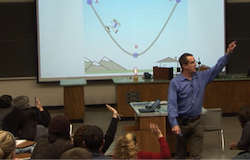
How do I use PhET simulations in my physics class?
June 28, 2016 by Stephanie Chasteen and Yuen-ying CarpenterPhET provides fun, free, interactive, research-based science and mathematics simulations. This post describes why you might want to use PhET, and how other faculty have integrated PhET into undergraduate physics courses -- in lecture, homework, labs, and with inquiry-based activities.
active learning, PhET Interactive Simulations
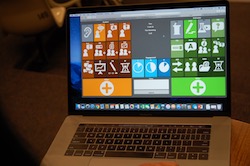
How can I assess the level of student engagement in my class?
June 20, 2017 by Stephanie Chasteen, University of Colorado BoulderInstructors who are attempting active learning are often concerned that students won't like it, or will resist. It can be hard, even in the middle of a course, to gauge how well-engaged students are. This article focuses on ways to assess student engagement, both formally and informally.
assessment, active learning, productive engagement, student buy-in

How can I design an effective in-class student worksheet for PhET simulations?
June 28, 2016 by Yuen-ying Carpenter and Stephanie ChasteenPhET simulations are free, online interactive simulations for teaching and learning science. In this document, we will discuss using PhET in a guided worksheet; a strategy which has been found to support student learning. But how do we help students use the questions and the simulation to think about the physics, or to practice new skills – not just focus on getting to the end of the worksheet?
active learning, PhET Interactive Simulations, worksheets, group work
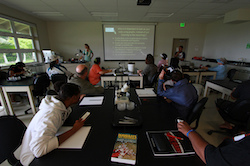
Where can I find good questions to use with clickers or Peer Instruction?
September 26, 2016 by Sam McKagan, PhysPort directorMany research-based teaching methods in physics, including Peer Instruction, CAE Think-Pair-Share, Technology Enhanced Formative Assessment, and teaching with clickers, involve having your students discuss and answer multiple-choice conceptual questions. A challenge of using these methods is finding and writing good questions. This recommendation helps you find and write questions for your class.
Peer Instruction, CAE Think-Pair-Share, Technology-Enhanced Formative Assessment, clickers

Arguments for skeptical colleagues
February 12, 2016 by Sam McKagan, PhysPort DirectorDo your skeptical colleagues question you or ask you to justify your use of research-based teaching methods in physics? This recommendation provides answers to the most frequently asked questions about research-based teaching in physics from your skeptical colleagues.
-What is PER and why should I care?
-What are research-based teaching methods in physics and why should I care?
skeptical colleagues, physics education research, active learning, assessment, problem solving

Administering research-based assessments online
February 10, 2016 by Adrian Madsen & Sam McKagan, PhysPort Assistant Director & DirectorAn overview of ways to administer research-based assessments online. Includes general guidelines and details about platforms for administering specific assessments including the FCI, FMCE, BEMA, CSEM, PCA, SOSESC-P, EMCS, CLASS, LSCI, E-CLASS, PLIC, FliP-CoIn, and MBT.
assessment, concept inventories, best practices, online tools

How can I help students become more expert learners? Metacognitive strategies for the classroom
June 20, 2017 by Stephanie Chasteen, University of Colorado BoulderStudents may approach coursework from a mechanistic stance: If the instructor gives me information, I will memorize it, and get a good grade. This approach to learning doesn't lend itself well to an active classroom, which requires students to wrestle with difficult ideas in order to lead to deeper conceptual learning.
active learning, metacognition, mastery, productive engagement, student buy-in

How can I create a classroom community, so that students feel encouraged to engage?
June 20, 2017 by Stephanie Chasteen, University of Colorado BoulderIt is challenging for instructors to create and maintain a classroom environment where students are comfortable engaging with each other and sharing their results with the class. This article focuses on creating a supportive and respectful classroom community that welcomes engagement, especially in a classroom using active learning.
active learning, community, productive engagement, student buy-in

Best Practices for Administering Concept Inventories
May 28, 2019 by Adrian Madsen, Sam McKagan, Ellie Sayre; PhysPort director, assistant director, and research directorThere are a plethora of concept inventories in physics available for faculty to use. These multiple-choice research-based tests about physics concepts are valuable because they allow for standardized comparisons among institutions, instructors, or over time. In order for these comparisons to be meaningful, you should use best practices for administering and interpreting the tests.
assessment, concept inventories, best practices
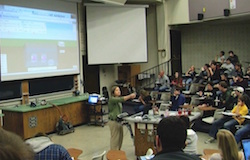
How do I increase student interactivity when using PhET simulations in lecture?
June 28, 2016 by Stephanie Chasteen and Yuen-ying CarpenterPhET simulations are free, online interactive simulations for teaching and learning science. The impact of lecture demonstrations using PhET is greatly increased when students are given the opportunity to interact with the simulations. This article discusses facilitating student discussions, peer instruction, and interactive lecture demonstrations, with PhET.
active learning, PhET Interactive Simulations, lecture, interactive lecture demonstration, peer instruction, clickers
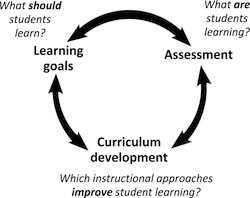
How do I develop student learning outcomes for physics courses?
August 12, 2021 by Stephanie ChasteenStudent learning outcomes, or SLOs, are an explicit statement of what you expect students to learn. SLOs can be defined for a topic, course or an entire program of study. SLOs define what is expected of students and what it means to understand something, without defining how that understanding will be taught. SLOs help sharpen the focus on student learning.
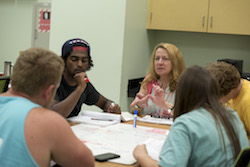
Where can I find good activities for small group discussions?
September 26, 2016 by Sam McKagan, PhysPort directorNearly all research-based teaching methods in physics involve some kind of small group discussions of challenging conceptual activities. Finding good activities is an important component of making small group discussions work in your class. This recommendation includes links to collections where you can find activities to use in your class.
active learning, group work, SCALE-UP, Peer Instruction, CAE Think-Pair-Share, Technology-Enhanced Formative Assessment, clickers

What are some tips for using PhET with homework?
June 28, 2016 by Stephanie ChasteenPhET simulations are free, online interactive simulations for teaching and learning science. PhET is ideal for use in homework because the simulations are designed to cue students to explore cause-and-effect relationships, even without an instructor present.
active learning, PhET Interactive Simulations, homework, assessment

Best practices for facilitating Periscope lessons for TA/LA training or faculty PD
February 10, 2016 by Rachel Scherr, creator of PeriscopePeriscope connects authentic video episodes from best-practices physics classrooms to big questions of teaching and learning. Periscope lessons are useful if you:
-supervise learning assistants (LAs) or teaching assistants (TAs)
-lead faculty development
-seek to improve physics teaching in your department
-want to improve your own physics teaching
Periscope, teaching assistant training, learning assistant training, faculty professional development, active learning, group work, best practices
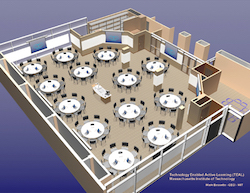
How do I design a SCALE-UP classroom?
September 22, 2017 by Robert Beichner, SCALE-UP developer, and Sam McKagan, PhysPort DirectorSCALE-UP is an integrated learning environment where the physical space is designed to discourage lecture and facilitate interactions between small groups working on short, interesting tasks. SCALE-UP classrooms often look more like a restaurant than a lecture hall. Because these classrooms are so different from traditional classroom settings, designing a SCALE-UP classroom can be a challenge.
SCALE-UP, active learning, classroom design

What kind of whiteboards should I use?
September 22, 2017 by Sam McKagan, PhysPort directorWhiteboards are a great tool for students to work out ideas individually and collaboratively, and to present those ideas. Based on reports from expert educators, this recommendation discusses the questions you should ask when choosing whiteboards, and the advantages and disadvantages of each type of whiteboard, product suggestions, and the advantages of whiteboards over other collaboration tools.
whiteboarding, best practices, SCALE-UP, Modeling Instruction

What racial, gender, and sexual orientation bias still exists in physics and what can I do about it?
February 10, 2016 by Ramón S. BarthelemyAs physicists we often believe that our field is a place where anyone can succeed regardless of race, gender, or sexual orientation. Although overt discrimination has decreased, many kinds of unintentional and intentional bias still run rampant. Fortunately, many of these biases are identifiable and there are actionable steps your department can take to prevent and address…

Which observation protocol should I use to observe teaching?
April 10, 2021 by Cassandra A. Paul, Adrian Madsen, Sarah B. McKagan, and Eleanor C. SayreThis expert recommendation describes and compares 7 observation protocols which enable faculty to articulate the goals of teaching observations and focus on particular aspects of the classroom.
observation protocols, teaching observations

What can I do if students don’t speak up in discussions?
June 20, 2017 by Stephanie Chasteen, University of Colorado BoulderMany active learning techniques require students to discuss their ideas either in small groups or in a large class discussion, but, as you know, students don't always erupt into productive conversation. This article focuses on helping students engage productively in discussions in active learning classrooms.
active learning, discussion, productive engagement, student buy-in
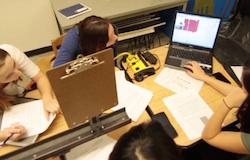
What are some tips for using PhET in a lab setting?
June 28, 2016 by Stephanie ChasteenPhET simulations are free, online interactive simulations for teaching and learning science. The simulations emphasize visual models, cause-and-effect relationships, and multiple representations. Using PhET in a lab setting has many benefits, such as allowing new possibilities for experiments (such as quantum mechanics), quick repeatability, and making visible the underlying mechanisms.
active learning, PhET Interactive Simulations, labs, recitation

Which mechanics research-based assessment should I use in my class?
April 10, 2021 by Adrian Madsen, Sarah B. McKagan, Eleanor C. SayreThis article discusses and compares 11 research-based assessments in kinematics and forces, energy, rotation and density to help instructors choose one to use in their introductory course. It also discusses one assessment for intermediate mechanics.
assessment, concept inventories, mechanics, kinematics, energy, rotation, density
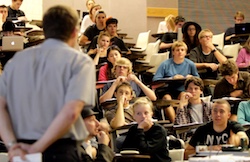
What are some strategies for the first day of class, to set the stage for student engagement?
June 20, 2017 by Stephanie Chasteen, University of Colorado BoulderThe first day is important for setting the class tone. It is especially important if you are using active engagement strategies, since students may not be expecting the energy and risk that an active classroom demands. This article focuses on activities that can be done in an active learning classroom in the first week of class, to increase student engagement throughout the semester.
first day of class, active learning, productive engagement, student buy-in

Ten results of physics education research that every physics instructor should know
February 11, 2016 by Sam McKagan, PhysPort DirectorThis is a draft outline for an article describing the results of physics education research that are most important for practicing physics instructors to know and apply in their classrooms. We will be publishing the results in installments on PhysPort. The goals of this article are to explain the research behind each result in enough detail that readers can easily understand why…
physics education research, active learning, assessment, problem solving, beliefs and attitudes

Strategies and resources for teaching your physics course online on short notice
March 24, 2020 by Chandralekha Singh, University of PittsburghDue to the COVID-19 pandemic, many of us teaching physics as well as those teaching other subjects in face-to-face brick-and-mortar classrooms have suddenly found themselves in an unprecedented situation: the rest of the term should immediately transition to a completely online format! Here I outline some strategies and resources that can help you and your colleagues.

What makes research-based teaching methods in physics work?
February 10, 2016 by Sam McKagan, PhysPort DirectorPhysPort contains guides to over 50 "PER-based teaching methods," also known as "interactive engagement" or "active learning" methods. We use "teaching method" in the broadest possible sense, to include curricula, techniques, resources, tools, and reform strategies. To implement these methods effectively, it is helpful to understand the essential features that make them work.

How can I train teaching assistants and/or learning assistants?
March 22, 2016 by Sam McKagan, PhysPort DirectorMany research-based teaching methods in physics include activities in which graduate teaching assistants (TAs) and/or undergraduate learning assistants (LAs) facilitate students working in small groups. The success of these methods thus depends heavily on how well TAs and LAs are trained in effective facilitation. Ideally, TAs and LAs should take a course in which they learn about the…
group work, teaching assistant training, learning assistant training, active learning
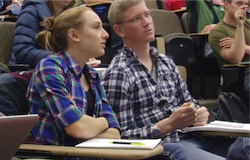
What are some tips for facilitating PhET with in-class worksheets?
June 28, 2016 by Emily Moore and Stephanie ChasteenPhET simulations are free, online interactive simulations for teaching and learning science. Some teachers use the simulations in-class with guided worksheets or labs. This document describes some suggestions for facilitating activities using PhET -- in a class, lab, or recitation -- in order to get your students to engage with PhET activities.
active learning, PhET Interactive Simulations, worksheets, group work

Best Practices for Administering Attitudes and Beliefs Surveys in Physics
June 13, 2019 by Adrian Madsen, Sam McKagan, Ellie Sayre; PhysPort director, assistant director, and research directorPhysics education researchers have created several surveys to assess one important aspect of thinking like a physicist: what students believe that learning physics is all about. In this article, we introduce attitudes and beliefs surveys and give advice on how to choose, administer, and score them in your classes.
assessment, beliefs and attitudes, best practices

Where can I learn more about research-based teaching in physics?
February 19, 2016 by Sam McKagan, PhysPort DirectorHere is a list of resources where you can learn more about research-based teaching in physics.
physics education research, active learning

Addressing common concerns about concept inventories
July 8, 2016 by Adrian Madsen, Sam McKagan and Eleanor SayreConcept inventories are useful for assessing the effectiveness of your teaching, but as you use them, concerns and questions often come up. Here we discuss some common concerns about using concept inventories and related research that addresses these concerns.
assessment, concept inventories

How can I get students to have productive discussions of clicker questions?
March 15, 2016 by Jenny Knight and Sarah Wise, University of Colorado - BoulderClicker questions are increasingly being used to stimulate student discussion and provide faculty and students with timely feedback. Research suggests that discussing clicker questions can lead to increased student learning, and that students exchanging constructive criticism can generate conceptual change.
What can you do as an instructor to encourage all students to have…
clickers, group work, active learning, best practices, peer instruction
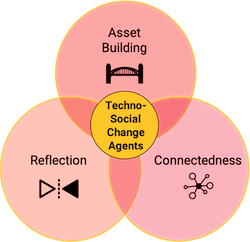
How can I create an inclusive and equitable classroom with culturally responsive education?
June 30, 2021 by Christine O'DonnellOne topic within ongoing discussions about justice, equity, diversity, and inclusion in physics is how we can transform our classroom environments to generate welcoming, inclusive, and equitable spaces for all students. I will discuss evidence-based approaches, and I will provide examples of what these approaches look like in practice using an astronomy curriculum I developed.
equity, culturally responsive education

How do I facilitate Tutorials in Introductory Physics?
March 15, 2016 by Sam McKagan and Stephanie ChasteenTutorials in Introductory Physics are a research-based student activity, developed by the Physics Education Group at the University of Washington (UW). Students work in small groups to complete worksheets based on common student difficulties. Extensive research has demonstrated that Tutorials can improve student learning when implemented properly. Tutorials have been implemented…
Tutorials in Introductory Physics, active learning, group work
How can I design (or find) a good group activity for physics students?
January 3, 2017 by Joshua Von Korff, Georgia State UniversityI want to give my students something to work on in groups, but what should they work on? I know that researchers have created many physics activities, but I don't know what I'm looking for. What does a good activity look like? OR, I'm really excited about inventing my own labs or worksheets to give students, but I don't know how to design an activity.

How can I talk about equity in physics classes?
February 6, 2021 by Danny Doucette, Shinae Park, and Moses RifkinThis article describes an approach to introducing discussions about equity into the physics classroom, based on the Underrepresentation Curriculum (https://underrep.com).
equity, underrepresentation, curriculum

How can I maintain sensemaking when moving my class from in-person to online?
March 13, 2020 by Andrew Elby (he/him) and Ayush Gupta (he/him, they/them)While switching your in-person, active-learning physics classroom to an online environment, how can you navigate technical and curricular issues in a kind and humane way? We argue for devoting some of your remaining bandwidth to this issue: helping students continue to frame their "in-class" activity as sense-making.
sensemaking, online tools, COVID-19
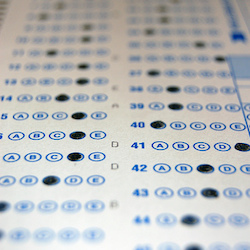
How are research-based assessment instruments developed and validated?
April 10, 2021 by Adrian Madsen, Sarah B. McKagan and Eleanor C. SayreThis article discusses the process of developing and validating research-based assessment instruments in the physics and astronomy education research community.
assessment, concept inventories

Which beliefs and attitudes research-based assessment should I use in my class?
April 10, 2021 by Adrian Madsen, Sarah B. McKagan, Eleanor C. Sayre, and Cassandra A. PaulThis article discusses and compares 9 research-based assessments about students' beliefs and attitudes, 2 assessments about the nature of science and 3 assessments about self-efficacy in physics.
assessment, concept inventories, beliefs and attitudes, nature of science, self-efficacy
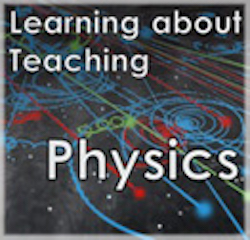
Learning About Teaching Physics Podcasts
July 9, 2012 by Michael Fuchs and Stephanie ChasteenWe're getting the physics education research out of those stuffy journals and into your hands (or, rather, ears) with this little audio podcast. Co-hosted by veteran high school physics teacher Michael Fuchs and physicist and education researcher Stephanie Chasteen, each episode investigates a piece of the research literature and how it can relate to your classroom.
active learning, physics education research, lecture, learning styles, clickers, Peer Instruction, CAE Think-Pair-Share, demonstrations

Which polling method should I use for Peer Instruction?
February 10, 2016 by Sam McKagan, PhysPort DirectorSeveral research-based teaching methods, including Peer Instruction, CAE Think/Pair/Share, and Technology-Enhanced Formative Assessment, involve asking students to discuss and answer multiple-choice conceptual questions in class. There are at least three methods of collecting students’ answers to these questions: clickers, flashcards, and show of hands. Lasry…
clickers, flashcards, Peer Instruction, CAE Think-Pair-Share, Technology-Enhanced Formative Assessment, active learning

Which mathematics research-based assessment should I use in my physics class?
April 10, 2021 by Adrian Madsen, Sarah B. McKagan, Eleanor C. Sayre, and Cassandra A. PaulThis article discusses and compares 6 research-based assessments in mathematics to use in your physics class to assess students' level of math readiness for a given physics class, or to assess students' understanding of math topics that are covered in physics classes.
concept inventories, assessment, mathematics, vectors

Recursos en Español / Research-based teaching resources in Spanish
March 16, 2016 by Sam McKagan, PhysPort DirectorPhysPort es un recurso de internet para apoyar a los profesores de física a utilizar estrategias de enseñanza y evaluación basadas en investigación en sus clases. El sitio es en ingles, pero muchos de los recursos a que se refiere han sido traducido a español. Esta página tiene una lista de recursos para enseñanza y evaluación…
active learning, assessment, español

How can I get my students’ answers to concept inventories into electronic spreadsheets?
February 10, 2016 by Sam McKagan, PhysPort DirectorIf you are using multiple-choice concept inventories such as the FCI, BEMA, or CLASS to assess your students’ learning, the PhysPort Data Explorer can help you get instant analysis and visualization of your results. In order to use the Data Explorer, you’ll need to have your students’ responses in some kind of electronic spreadsheet, such as an Excel or .csv file.…
assessment, concept inventories

Which electricity and magnetism research-based assessment should I use in my class?
April 10, 2021 by Adrian Madsen, Sarah B. McKagan, Eleanor C. SayreThis article discusses and compares 9 research-based assessments in electricity, magnetism and circuits to help instructors choose one to use in their introductory course. It also discusses 3 electricity and magnetism for upper-level courses.
assessment, concept inventories, electricity and magnetism, circuits, electrodynamics

Which scientific reasoning research-based assessment should I use in my class?
April 10, 2021 by Adrian Madsen, Sarah B. McKagan, Eleanor C. Sayre, and Cassandra A. PaulThis article discusses and compares 2 research-based assessments on scientific reasoning to help you choose one to use in your course.
assessment, concept inventories, scientific reasoning

Which problem-solving research-based assessment should I use in my class?
April 10, 2021 by Adrian Madsen, Sarah B. McKagan, Eleanor C. Sayre, and Cassandra A. PaulThis article discusses and compares 3 research-based assessments on problem solving to help you choose one to use in your course.
concept inventories, assessment, problem solving

How can I teach a graduate class on the basics of physics education research?
March 23, 2016 by Sam McKagan, PhysPort DirectorSeveral leaders in physics education research (PER) have put together "Intro to PER" courses for graduate students and advanced undergraduates. If you are teaching a course like this, this collection of course websites and syllabi contains lots of good ideas for what to do in your course.

How can I set up an effective mentoring program to support students in my department?
February 10, 2016 by Ramón S. BarthelemyAs physicists and physics educators we know that a physics education is much more than computational problem solving and bookwork. Knowledge and skills needed to navigate a career pathway in physics that are often learned informally include:
-the unspoken requirement to do undergraduate research
-the necessity to study for the physics GRE well in advance of the test date
-strong research lab...

Which quantum mechanics or modern physics research-based assessment should I use in my class?
April 10, 2021 by Adrian Madsen, Sarah B. McKagan and Eleanor C. SayreThis article discusses and compares 3 intermediate quantum mechanics research-based assessments, 5 upper-level quantum mechanics assessments and one relativity assessment to help instructors choose one to use in their course.
concept inventories, assessment, quantum mechanics, modern physics
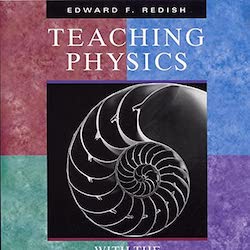
Introduction to research-based teaching in physics (Teaching Physics with the Physics Suite)
December 27, 2023 by Joe Redish, with introduction by Sam McKaganTeaching Physics with the Physics Suite is a book written by Joe Redish, one of the early leaders of physics education research. It was published in 2003 and still provides one of the best introductions to research-based teaching in physics. You can download the entire book in pdf format for free here on PhysPort, or buy it from Wiley.
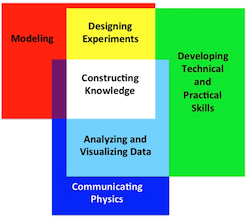
How do I design introductory physics labs to meet specific goals?
December 21, 2023 by N. G. Holmes, Laboratory of Atomic and Solid State Physics and the Department of Physics, Cornell UniversityThere are a lot of things going on in a lab: from handling equipment, analyzing data, coordinating data with relevant physics ideas, to communicating results and working in a team. How do you decide what goals to focus on and what kinds of activities are best suited to those goals?

Which observation protocols are available online?
January 22, 2019 by Cassandra Paul and Adrian MadsenSeveral observation protocols are available on the General Observation and Reflection Platform (GORP). GORP is a secure web-based platform that allows users to customize existing observation protocols, (and create their own protocols), in order to simplify data collection and sharing.
observation protocols, online tools, assessment
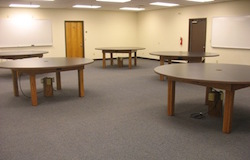
How to build tables for SCALE-UP classrooms
September 22, 2017 by Bill Nettles, Union UniversityHere are instructions for building 7-foot diameter round tables for use in SCALE-UP classrooms, where students spend the majority of their time working in small groups on interesting projects. These tables are the ideal size and shape for SCALE-UP classrooms, according to the developer of SCALE-UP, and can comfortably seat 3 groups of 3 students at each table.

Which laboratory skills research-based assessment should I use in my class?
April 10, 2021 by Adrian Madsen, Sarah B. McKagan, Eleanor C. Sayre, and Cassandra A. PaulThis article discusses and compares 4 research-based assessments on lab skills to help you choose one to use in your course.
concept inventories, research-based assessment, labs

Which thermodynamics research-based assessment should I use in my class?
April 10, 2021 by Adrian Madsen, Sarah B. McKagan and Eleanor C. SayreThis article discusses and compares 4 research-based assessments on thermodynamics help instructors choose one to use in their course.
concept inventories, assessment, thermodynamics
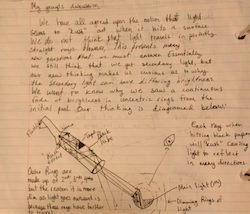
How can I fulfill “writing across the curriculum” requirements in a physics class?
July 11, 2019 by Leslie Atkins ElliottMany universities require a "writing across the curriculum" (WAC) course, where students receive focused instruction on writing in their discipline. Informal writing is integral to how physicists do physics. By explicitly attending to informal writing, you can address many WAC goals and support the effective use of research-based methods in physics.
writing, lab notebooks, whiteboarding

Which astronomy research-based assessment should I use in my class?
April 10, 2021 by Adrian Madsen, Sarah B. McKagan and Eleanor C. SayreThis article discusses and compares 8 research-based assessments in astronomy to help instructors choose one to use in their introductory course.
assessment, concept inventories, astronomy

Security FAQ for the PhysPort Data Explorer
January 22, 2016 by Eleanor Sayre, Sarah McKagan, and Adrian MadsenA common question about the Data Explorer is: "This all sounds great, but can I really upload student data to your site? Is it safe and secure? Do I have to have approval?" We've compiled detailed responses to these Frequently Asked Questions and more about the Data Explorer's safety and security.

How do I get my students to take concept inventories seriously?
January 12, 2016 by Adrian Madsen, PhysPort Assistant DirectorConcept inventories are useful for assessing the effectiveness of your teaching, but only if your students take them seriously. You may be worried about how seriously your students are taking them. Here is what we know about students taking concept inventories seriously and some ideas for how you can encourage your students to do their best on these kinds of tests.
How seriously do…
assessment, concept inventories

Which optics and waves research-based assessment should I use in my class?
April 10, 2021 by Adrian Madsen, Sarah B. McKagan and Eleanor C. SayreThis article discusses and compares 5 research-based assessments on optics and waves: 4 for introductory courses and 1 for an upper-level course.
concept inventories, assessment, optics, waves
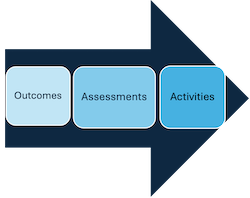
What is “backwards design” and how can I use it in my physics classes?
March 11, 2025 by Stephanie Chasteen (University of Colorado Boulder) and Lauren Bauman (PhysPort)Quick tips from the Faculty Teaching Institute about how to implement backwards design. Backwards design is a method for course planning where the instructor starts from the "end goal" or "learning objectives"--what they want their students to know--and then works backwards, designing assessment activities and learning activities that are aligned with the end goal.
Faculty Teaching Institute, backwards design, student learning outcomes
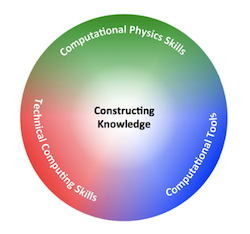
How can I integrate computation into my physics classes and curriculum?
December 21, 2023 by Danny Caballero, Larry Engelhardt, Marie Lopez del Puerto, and Kelly RoosAs educators, we should give our students the opportunity to engage with computation throughout the physics curriculum. In this recommendation we will (a) discuss how to make a plan, (b) link to resources and to examples of successful approaches from a variety of instructors at a variety of institutions, and (c) talk about other issues to consider as you integrate computation.

What are summative assessment techniques?
March 11, 2025 by Stephanie Chasteen, University of Colorado BoulderSummative assessment is assessment to evaluate student learning at the end of instruction. Summative assessment is often high-stakes.
Faculty Teaching Institute, summative assessment

What are some best practices for think-pair-share?
March 11, 2025 by Stephanie Chasteen, University of Colorado BoulderThese quick tips from the Faculty Teaching Institute can be used with think-pair-share (TPS), where students think on their own, pair to talk to a neighbor, and share with the whole class, with or without polling.
Faculty Teaching Institute, CAE Think-Pair-Share

What are formative assessment techniques?
March 11, 2025 by Stephanie Chasteen, University of Colorado BoulderFormative assessment is low-stakes, ongoing assessment to monitor students' learning and give them feedback during instruction. Classroom assessment techniques (CATs) are classroom activities to quickly gauge student understanding.
Faculty Teaching Institute, formative assessment

What are student-centered instructional techniques?
March 11, 2025 by Stephanie Chasteen, University of Colorado BoulderThis Expert Recommendation provides a quick overview of student-centered instructional techniques from the Faculty Teaching Institute. Student-centered instruction places the focus on the learner (rather than the instructor), emphasizing student ideas and thinking; it includes but is not limited to active learning.
Faculty Teaching Institute, active learning

How can I make my class more inclusive?
March 11, 2025 by Stephanie Chasteen, University of Colorado BoulderQuick tips from the Faculty Teaching Institute to help make your class more inclusive.
Faculty Teaching Institute, inclusive teaching, inclusion, equity

How can I run a great whole-class discussion?
March 11, 2025 by Stephanie Chasteen, University of Colorado BoulderQuick tips from the Faculty Teaching Institute about how to run whole-class discussions. Whole class discussions are an opportunity for community dialogue. Below are practices to increase the number participating, give them time to think, and make it non-threatening and inclusive.
Faculty Teaching Institute, class discussion

How can I improve the way I grade student work?
March 11, 2025 by Stephanie Chasteen, University of Colorado BoulderThese quick tips from the Faculty Teaching Institute can be used to improve grading in your classes.
Faculty Teaching Institute, grading, assessment

How do I structure group work?
March 11, 2025 by Stephanie Chasteen, University of Colorado BoulderQuick tips from the Faculty Teaching Institute about how to structure group work.
Faculty Teaching Institute, group work

What are teaching reflection strategies and how can I use them in my classroom?
March 11, 2025 by Stephanie Chasteen, University of Colorado BoulderTeaching reflection involves considering your teaching experiences, learning from the outcome, and planning how to better approach similar situations in the future. This Expert Recommendation will give an overview of the constellation of teaching reflection strategies and some reflection prompts.
Faculty Teaching Institute, reflection strategies

How can I improve labs?
March 11, 2025 by Stephanie Chasteen, University of Colorado BoulderThese quick tips from the Faculty Teaching Institute can be used to make labs more effective.
Faculty Teaching Institute, labs

How can I make my lectures more effective?
March 11, 2025 by Stephanie Chasteen, University of Colorado BoulderQuick tips from the Faculty Teaching Institute about how to create effective and inclusive presentations.
Faculty Teaching Institute, lecture, presentation

How should I facilitate group work?
March 11, 2025 by Stephanie Chasteen, University of Colorado BoulderThese quick tips from the Faculty Teaching Institute can help facilitate group work.
Faculty Teaching Institute, facilitation, group work

How can I engage students on the first day and throughout the term?
March 11, 2025 by Stephanie Chasteen, University of Colorado BoulderQuick tips from the Faculty Teaching Institute about engaging students on the first day and throughout the term.
Faculty Teaching Institute, productive engagement, active learning, first day of class, student buy-in

How can I develop exams that help me fairly assess student learning?
March 11, 2025 by Stephanie Chasteen, University of Colorado BoulderThese are quick tips from the Faculty Teaching Institute for using summative assessments (primarily exams and quizzes) in ways that will assess what you value in student learning while being compassionate, clear, and fair, and facilitating student learning.
Faculty Teaching Institute, summative assessment, exams

How can I use simulations and demonstrations more effectively?
March 11, 2025 by Stephanie Chasteen, University of Colorado BoulderQuick tips from the Faculty Teaching Institute to help you use simulations and demonstrations more effectively.
Faculty Teaching Institute, simulations, demonstrations

How can I help my students read more effectively?
March 11, 2025 by Stephanie Chasteen, University of Colorado BoulderQuick tips from the Faculty Teaching Institute about how to support students in reading text effectively.
Faculty Teaching Institute, reading, Just-in-time teaching

How can I help my students with quantitative problem solving?
March 11, 2025 by Stephanie Chasteen, University of Colorado BoulderQuick tips from the Faculty Teaching Institute about how to support students with quantitative problem solving
Faculty Teaching Institute, quantitative, problem solving

How can I develop homework and quizzes to learn about student thinking?
March 11, 2025 by Stephanie Chasteen, University of Colorado BoulderThese are quick tips from the Faculty Teaching Institute for developing homework and quizzes to learn about student thinking. Homework and quizzes are useful tools for students to practice new concepts and skills and get feedback. In-class formative assessments (Classroom Assessment Techniques, or CATs) give on-the-spot feedback to students and teachers.
Faculty Teaching Institute, formative assessment, homework

How can I improve assessment in my classes?
March 11, 2025 by Stephanie Chasteen, University of Colorado BoulderQuick tips from the Faculty Teaching Institute about using assessment to improve your classes.
Faculty Teaching Institute, assessment

How can I help motivate my students to learn?
March 11, 2025 by Stephanie Chasteen, University of Colorado BoulderQuick tips from the Faculty Teaching Institute about how to motivate your students to learn.
Faculty Teaching Institute, motivation, productive engagement, student buy-in

How can I make my large class more effective?
March 11, 2025 by Stephanie Chasteen, University of Colorado BoulderQuick tips from the Faculty Teaching Institute about how to make large classroom learning environments more effective.
Faculty Teaching Institute, large classes, active learning

What are educational technologies and how can I use them in my classroom?
March 11, 2025 by Stephanie Chasteen, University of Colorado BoulderEducational technology is the use of computer software and hardware for learning purposes.
Faculty Teaching Institute, educational technologies

How can I get started designing a new course?
March 11, 2025 by Stephanie Chasteen, University of Colorado BoulderQuick tips from the Faculty Teaching Institute to help you get started designing a new course.
Faculty Teaching Institute, course design
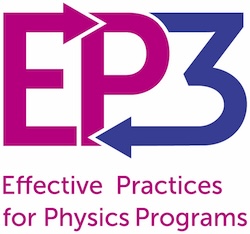
How to Select and Use Various Assessment Methods in Your Program
August 3, 2025 by The EP3 InititativeWe provide guidance on a variety of assessment methods and tools such as surveys, inventories, and classroom observation to measure progress and drive future action. This includes (1) general guidance on how to engage in actionable assessment and specific guidance on assessment methods for (2) departmental function and initiatives, (3) teaching effectiveness, and (4) student learning.
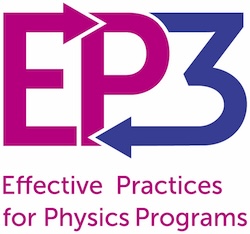
Implementing Research-Based Teaching in Your Classroom
August 3, 2025 by The EP3 InititativeThis recommendation provides guidance for classroom instructors on how to understand and implement research-based teaching in physics classes to improve learning of physics content and development of problem-solving skills; support non-content goals including improving students' attitudes and beliefs about physics, science identities, and metacognition; and support inclusive learning environments.
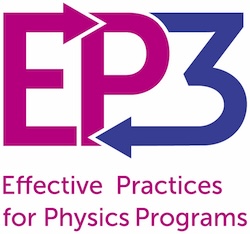
Supporting Research-Based Teaching in Your Department
August 3, 2025 by The EP3 InititativeThis recommendation provides guidance for department chairs and leaders to create departmental and cultural structures to support instructional staff in implementing research-based teaching in your department.



